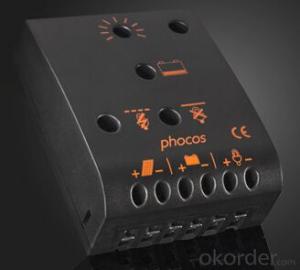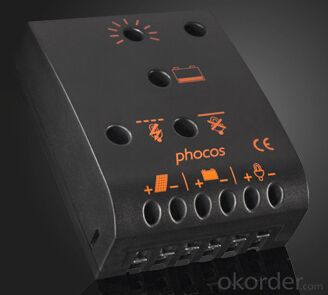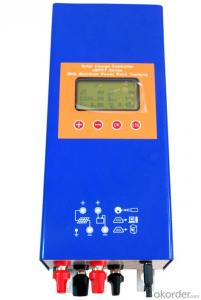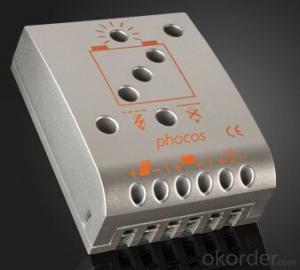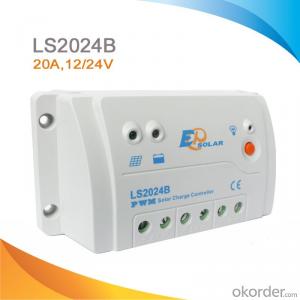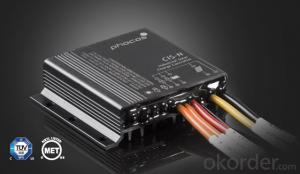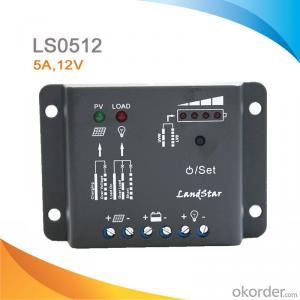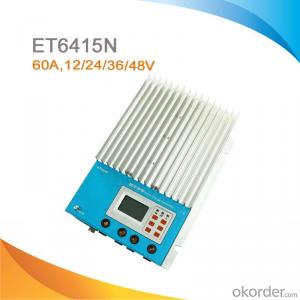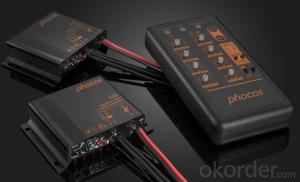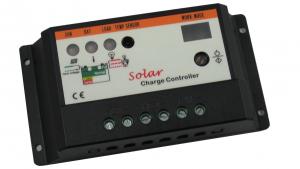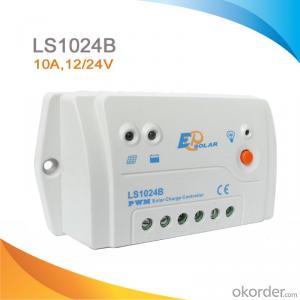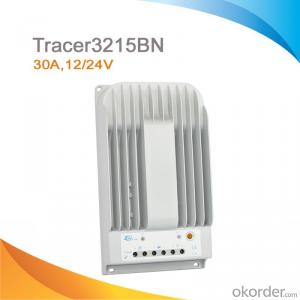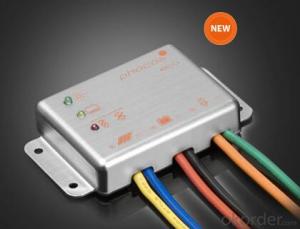12V CA Series (6-14A) Solar Charge Controller
- Loading Port:
- China Main Port
- Payment Terms:
- TT OR LC
- Min Order Qty:
- -
- Supply Capability:
- 10000 unit/month
OKorder Service Pledge
OKorder Financial Service
You Might Also Like
· Electronically regulated charging regime: Boost and float charge
· Deep discharge protection
· PWM series regulation, no panel short circuit
· Integrated temperature compensation
· Fully electronically protected:
·
Panel surge voltage
·
Wrong polarity at panel or battery
·
Overload and short circuit at load
· 3 LED indications: Charge Status, SOC, LVD, Overload! Short Circuit
· Common positive allows grounding
· The new version of CA solar charge controller series is especially designed for small solar systems with the need of a low battery disconnect feature.
· Main differences to the preceding CA series:
· The regulation circuit provides now series regulation to prevent single cell overheat problems of short-circuited solar panels. The terminal section has been replaced by a rugged, well profen 16 mm2 terminal block.
· The melting fuse of the predecessor has been replaced by a fully electronically protected circuit.
· 2 LEDs and 1 Duo-LED to display charging in progress, battery SOC, load disconnect and overload status. Leisure and rural electrification systems are the typical applications for this product. It is a perfect solution for cost-sensitive systems which require state-of-the-art system management.
· The compact case is now similar to the well-known CML series.
- Q: Can a solar controller be used with portable solar panels?
- Yes, a solar controller can be used with portable solar panels. A solar controller helps regulate and optimize the charging process, protecting the batteries from overcharging and maximizing the efficiency of the solar panels. It can be particularly useful when using portable solar panels to ensure a consistent and reliable power source for various devices or appliances.
- Q: Can a solar controller be used with solar-powered drones?
- Yes, a solar controller can be used with solar-powered drones. A solar controller regulates the amount of solar energy being supplied to the drone's batteries, ensuring efficient charging and preventing overcharging. This helps to optimize the drone's performance and extend its flight time.
- Q: Can a solar controller be used with a generator backup system?
- Yes, a solar controller can be used with a generator backup system. The solar controller helps regulate the charging of batteries from solar panels, while the generator backup system provides alternative power during periods of low sunlight or high demand. The two systems can work together to ensure a reliable and efficient power supply.
- Q: How does a solar controller prevent damage to the solar panels during hail or storm events?
- A solar controller prevents damage to solar panels during hail or storm events by disconnecting the panels from the electrical system. When it detects an extreme weather event, such as hail or a storm, the solar controller automatically shuts off the power flow from the panels, ensuring that no electrical currents pass through them. This prevents any potential damage that could be caused by the high winds, hailstones, or other hazardous conditions associated with such events.
- Q: How does a solar controller handle power surges from the solar panels?
- A solar controller typically handles power surges from solar panels by using a built-in protection mechanism. This mechanism regulates the flow of electricity, preventing any excess power from reaching the batteries or other connected devices. It ensures that the voltage and current levels remain within safe limits, safeguarding the entire solar power system from potential damage caused by power surges.
- Q: Can a solar controller be used with a solar-powered billboard or signage?
- Yes, a solar controller can be used with a solar-powered billboard or signage. A solar controller regulates and controls the charging of batteries in a solar power system, ensuring efficient energy storage and preventing overcharging or damage to the batteries. In the case of a solar-powered billboard or signage, the solar controller would manage the flow of energy from the solar panels to the batteries, allowing for consistent and reliable power supply to the signage even during periods of low sunlight or at night.
- Q: How does a solar controller handle reverse current protection?
- A solar controller handles reverse current protection by using a diode or a solid-state switch to prevent current from flowing back into the solar panels when they are not generating power. This ensures that the energy generated by the panels is properly stored in the batteries and not wasted.
- Q: I bought a solar panel controller, the instructions I was thrown, and later found the model all in the manual, a total of 0 to 29 these models, do not know the meaning of the model. Does anyone know?
- Pure light control mode: when there is no sunlight, the light intensity dropped to the starting point, the controller delay 10 minutes to confirm the start signal, according to the set parameters to open the load, the load began to work; when there is sunlight, light intensity rose to the starting point, The controller delays 10 minutes after confirming the shutdown signal and turns off the output. The load stops working. Light control + time control mode: start the same process and pure light control, when the load to set the time to automatically shut down, set the time 1 to 14 hours. Manual mode: In this mode, the user can press the button to control the load on and off, regardless of whether the day or night. This mode is used for some special load or debug mode when used in debugging: for system debugging, when the optical signal is closed, no light signal load, easy installation and commissioning check the correctness of the system installation. Normally open mode: The power-on load remains in the output state, which is suitable for 24-hour power supply.
- Q: What are the safety precautions when installing a solar controller?
- When installing a solar controller, it is important to follow certain safety precautions. Firstly, ensure that the power source is switched off and the solar panels are not receiving any sunlight during the installation process. This will prevent any potential electrical shocks or accidents. Additionally, use insulated gloves and tools to handle any live or exposed wires. Always refer to the manufacturer's instructions and guidelines to ensure proper installation and wiring. It is also advisable to have a qualified electrician or solar professional present to assist with the installation, especially if you are unfamiliar with electrical work. Lastly, make sure to wear appropriate protective gear such as safety goggles and gloves throughout the installation process to minimize any potential risks.
- Q: Can a solar controller be used with solar panels that are connected to a solar security system?
- Yes, a solar controller can be used with solar panels that are connected to a solar security system. A solar controller helps regulate the charging and discharging of the batteries connected to the solar panels, ensuring optimal performance and protection for the security system.
Send your message to us
12V CA Series (6-14A) Solar Charge Controller
- Loading Port:
- China Main Port
- Payment Terms:
- TT OR LC
- Min Order Qty:
- -
- Supply Capability:
- 10000 unit/month
OKorder Service Pledge
OKorder Financial Service
Similar products
Hot products
Hot Searches
Related keywords
